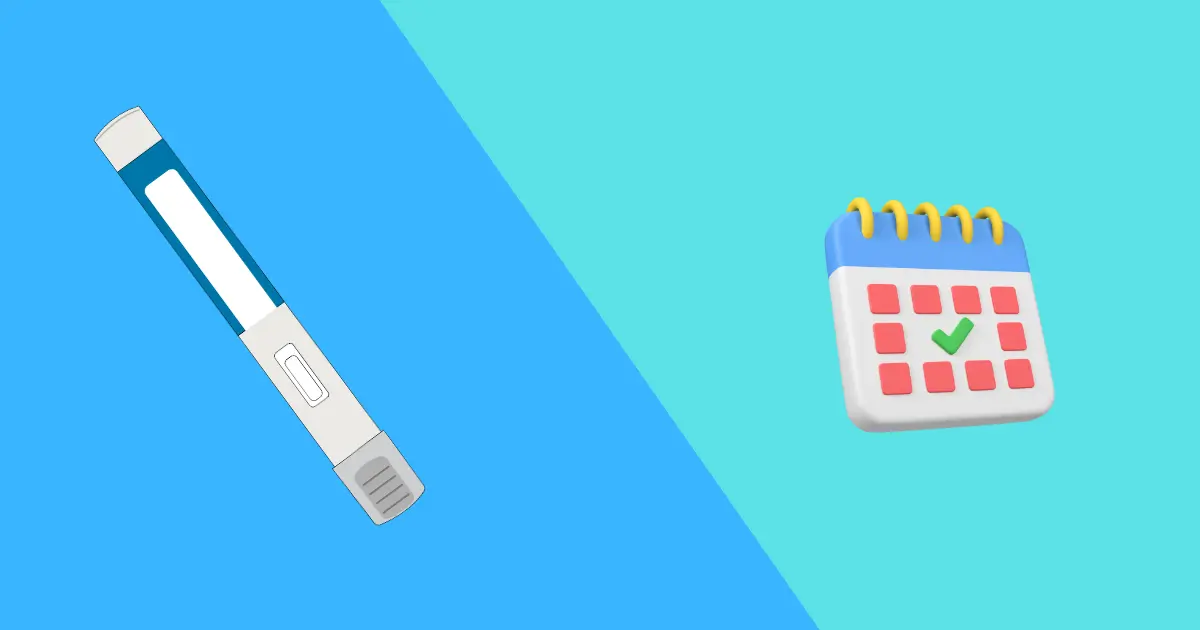How much weight can you lose on semaglutide in 3 months?
Wondering what’s realistic for weight loss on semaglutide after 3 months? Keep reading to find out how much weight you should expect to lose.
Key highlights
- Semaglutide is an FDA-approved GLP-1 receptor agonist that is used to treat adults with type 2 diabetes mellitus and obesity.
- This medication works by suppressing appetite, delaying gastric emptying, regulating blood sugar levels, and increasing insulin sensitivity, which creates a calorie deficit and steady weight loss.
- Most people lose 6% of their initial body weight after 3 months on semaglutide when used along with a healthy lifestyle and balanced diet.
- Weight results vary from person to person depending on the semaglutide dose, metabolism, and underlying health conditions, starting weight, and lifestyle habits.
- To maximize the benefits of semaglutide, follow your recommended titration schedule, eat a balanced and high-protein diet, stay hydrated, exercise regularly, and consult with your healthcare professional for ongoing care and monitoring.
Semaglutide is a GLP-1 receptor agonist, available under three brand names: Ozempic, Wegovy, and Rybelsus. The medication is approved by the U.S. Food and Drug Administration (FDA) for managing blood sugar levels in individuals with type 2 diabetes mellitus (Ozempic and Rybelsus) and chronic weight management (Wegovy). Semaglutide mimics the activity of the natural hormone glucagon-like peptide 1 (GLP-1), which helps regulate blood sugar levels, delays gastric emptying, decreases appetite, and increases the feeling of fullness. These actions improve blood sugar levels, promote weight loss, and improve overall health and wellness.
The popularity of semaglutide for weight management has significantly increased in recent years due to its promising results. Most users experience weight loss of 7 lbs (approximately 6-7% of their body weight) in the first 3 months when the medication is used in combination with a healthy diet and exercise.
However, it is important to understand that semaglutide is not a quick fix for obesity and overweight. The medication takes time to show results. The first three months after starting semaglutide are crucial for evaluating progress.
In this article, we will discuss semaglutide, how it works for weight loss, individual variability, timelines, and practical strategies for optimizing results. This guide will highlight what clinical studies and real-world data reveal about weight loss during the first three months on semaglutide, the factors that influence outcomes, and actionable tips to help you maximize your progress.
What the evidence shows: Semaglutide 3-month weight loss results
Clinical trials show that most individuals using semaglutide for weight management lose 6-7% of their body weight within the first three months. However, these results may vary among individuals. Some individuals may experience better outcomes, while others may see little or no change after the first 3 months. This variation depends on the following factors:
- Baseline weight
- Lifestyle changes
- Dosage
- Individual metabolic response
The general medical recommendation for healthy weight loss is 0.5-2 lbs per week (roughly 6-24 lbs in 3 months). However, semaglutide often exceeds this limit. According to the STEP-1 clinical trial, patients who consumed semaglutide 2.4 mg once weekly experienced an average weight loss of 15% of their body weight after 68 weeks of treatment.
General averages
In a clinical study, participants taking semaglutide for weight management typically lost an average of approximately 5.9% of their body weight, equivalent to roughly 6–7 lbs, within the first three months. Patients taking the highest dose of semaglutide lost 6.9% of their body weight, while those taking lower doses lost 5.1% of their initial body weight.
Clinical trial data
In the STEP 1 clinical trials published in the New England Journal of Medicine (NEJM) in 2021, 1,961 participants without type 2 diabetes received semaglutide 2.4 mg once weekly, along with lifestyle modifications. They lost an average of 9.6% of their starting body weight after 3 months.
In the STEP 2 clinical trials, 1,210 participants with type 2 diabetes who received semaglutide 2.4 mg once weekly lost approximately 5% of their body weight.
In the STEP 3 clinical trials, 611 adults with overweight or obesity without diabetes were enrolled to receive intensive behavioral therapy (IBT) combined with an initial low-calorie diet. The randomized and double-blinded study compared the effect of weekly semaglutide 2.4 mg plus IBT against placebo plus IBT over 68 weeks. By the end of the three months, participants receiving semaglutide lost approximately 9 to 9.5% of their baseline body weight, while those in the placebo group lost 6% of their body weight.
The outcomes of clinical trials are summarized below:
Semaglutide weight loss in clinical trials
| Trial | Population | Weight loss with Semaglutide 2.4 mg (≈12 weeks) | Weight loss with the Placebo (≈12 weeks) |
|---|---|---|---|
| STEP 1 | Adults with overweight/obesity, no diabetes | 9.6% of body weight | 2.80% |
| STEP 2 | Adults with overweight/obesity, with T2D | 5% of body weight | 2–3% |
| STEP 3 | Adults with overweight/obesity, no diabetes, with intensive behavioral therapy | 9 to 9.5% of body weight | 6% |
Cohort studies and real-world studies also indicate that participants taking semaglutide 2.4 mg once weekly experience weight loss of 5-7% by the end of 3 months. However, patients with type 2 diabetes mellitus tend to lose less weight than those who are non-diabetic. The outcomes of various cohort studies are as follows:
Semaglutide weight loss studies
| Study | Population | Avg. Weight Loss at 3 Months |
|---|---|---|
| JAMA Network Open (US, 2022) | 175 adults with obesity (weight clinic) | Patients lost 6% (6–7 kg) of body weight, Patients without diabetes lost more (6.3%) than those with diabetes (3.9%). |
| Real-World Multicenter (2023) | 350 adults, mostly women, routine care | Patients lost 6.6% of body weight. 65% of patients lost ≥5% of body weight by 3 months. |
| Pakistan Cohort (2024) | Adults with obesity (mixed diabetes status) | Patients lost 5–6% (6 kg) of body weight. Same results in diabetics and non-diabetics. |
Semaglutide not only supports weight reduction, but the medication also contributes to various health benefits, such as:
- Early weight loss with semaglutide can lower blood pressure, reduce strain on the heart, and decrease the risk of cardiovascular disease.
- The medication improves cholesterol levels by reducing harmful LDL (‘bad’ cholesterol) and increasing HDL (‘good’ cholesterol) levels.
- Early weight loss in individuals with diabetes can improve blood sugar control and may reduce the need for additional medications.
- The medication helps decrease fat accumulation in the liver and lowers the risk of fatty liver disease.
- Semaglutide reduces inflammation in the body by lowering the levels of inflammatory cytokines. The medication is also helpful in managing PCOS.
Key factors that influence weight loss results
The weight loss results of semaglutide vary from person to person. The following factors can impact the effectiveness of semaglutide for weight loss:
Starting weight and metabolism
Your baseline weight plays an important role. People with significantly high body weight may experience greater weight loss than those with a low body weight. The body’s metabolism also plays an important role. Individuals with a fast metabolism may get faster results than those with a slow metabolism and a sedentary lifestyle.
Moreover, people with a higher BMI (more than 35) often lose weight more quickly in the initial phase of semaglutide treatment. Obese patients have large fat stores, which create a greater potential for energy mobilization when appetite and calorie intake are reduced.
Diabetes also affects the percentage of weight loss in individuals taking semaglutide. Clinical trials indicate that patients with type 2 diabetes experience less weight loss than those who are obese (non-diabetic). In the STEP-1 clinical trial, non-diabetic patients taking 2.4 mg of semaglutide lost 14.6% of their body weight, compared to 2.4% with placebo. In the STEP-2 clinical trial, patients with type 3 diabetes lost 9.6% of body weight, compared to 3.4% with placebo.
Dosage and titration schedule
Dosage and titration schedule also influence your weight loss results. Semaglutide therapy is initiated with the lowest recommended dose (0.25 mg), which is administered once weekly for the first four weeks. Dosage of semaglutide is gradually increased every 4 weeks to help your body adapt to physiological changes and minimize the risk of gastrointestinal side effects, such as nausea, vomiting, diarrhea, and constipation. However, patients who increase the semaglutide dose too quickly may experience more severe side effects, which may reduce adherence and compromise the results.
Your healthcare provider will increase the dose to 0.5 mg, 1 mg, and 2.4 mg (if needed) according to your body’s response. This is why the 3-month time period is very crucial to evaluate the overall progress (blood sugar control and weight loss).
The titration schedule of semaglutide is :
Semaglutide dosing schedule
| Weeks | Dose | Purpose |
|---|---|---|
| Weeks 1–4 | 0.25 mg once weekly | Starting dose to allow body adaptation. This is not intended for full weight loss effect |
| Weeks 5–8 | 0.5 mg once weekly | Increased dose with gradual adaptation. Patient experience mild appetite suppression |
| Weeks 9–12 | 1.0 mg once weekly | Therapeutic threshold dose for diabetes. Weight loss becomes more noticeable with this dose |
| Week 13+ | 1.7–2.4 mg (maintenance/therapeutic) once weekly | Higher therapeutic doses for obesity. These are given for maximum weight loss. |
The results of semaglutide are typically dose-dependent. A higher dose of semaglutide leads to greater weight loss and improved blood sugar control compared to lower doses. For example, patients who administer 2.4 mg of semaglutide per week for chronic weight management experience more weight loss than those who receive a 1 mg dose of semaglutide.
Don’t skip your dose, because missed or skipped doses can reduce the effectiveness of the medication. Therefore, it is essential to follow the prescribed dosing schedule provided by your healthcare provider for optimal results.
Lifestyle changes
Semaglutide effectively suppresses your appetite and reduces hunger cravings, but this medication is not a standalone solution. Weight loss with semaglutide is also influenced by your diet, calorie intake, and physical activity. Patients who take semaglutide in conjunction with a healthy lifestyle tend to experience better results than those who have a sedentary lifestyle and unhealthy eating habits.
Consider a diet rich in lean proteins, vegetables, fruits, whole grains, and healthy fats that support satiety and prevent muscle mass loss during weight loss. Protein intake is highly important because it preserves muscle mass, supports metabolism, and increases the feeling of fullness. Stay hydrated to enhance your digestion and metabolism.
Regular physical activity is very important during weight loss treatment with semaglutide. Incorporate strength training and aerobic exercise in your routine to maximize your weight loss and glycemic control.
Metabolic and individual differences
Weight loss with semaglutide varies from person to person. Hormonal conditions, as well as the body’s metabolism, play an important role in overall outcomes.
Conditions such as hypothyroidism, polycystic ovarian syndrome (PCOS), and other endocrine disorders can affect weight loss progress. Therefore, managing thyroid problems and hormonal imbalances can lead to improved outcomes.
Every individual has a unique metabolism. Some individuals have faster metabolism and tend to burn calories more efficiently than those with slower metabolism.
Genetics also plays a significant role in regulating your appetite, fat distribution, and response to medications. That is why two people on the same dose may experience different outcomes, depending on their genetics and metabolic profiles.
Individuals with a higher starting weight tend to experience greater weight loss than those with a lower starting weight.
Patients with type 2 diabetes mellitus may experience less weight loss than those who are obese and non-diabetic.
Adherence and duration
The effectiveness of semaglutide depends on adherence to the treatment regimen. Patients who follow the recommended titration schedule provided by their healthcare provider and remain consistent with it tend to see better results.
Semaglutide is typically initiated with a low dose (0.25 mg) and gradually increased to 0.5 mg, 1mg, and 2.4 mg. The medication is titrated every 4 weeks. Skipping a dose or increasing the medicine too quickly can reduce its effectiveness and increase the risk of side effects.
Clinical trials suggest that patients who continued taking semaglutide for 68 weeks experienced greater weight loss (14.9% of their body weight) compared to those who discontinued the medication. Patients who discontinued semaglutide regained their weight.
Week-by-week weight loss timeline
It is important to understand that individual results vary widely. Some people lose weight quickly, while others may lose slowly. Even if the progress feels slow, consistent use of medications according to your treatment plan and a healthy lifestyle can help you lose body weight.
The following is a general weight loss timeline:
Month 1
The first month is the titration period, when the doses are small (0.25 mg). In this period, appetite suppression begins gradually, but common side effects such as nausea, vomiting, diarrhea, and constipation may appear as the body adapts to the medication. Many patients notice mild appetite suppression within 1-2 weeks. You may notice little weight change after 4 weeks.
In a double blind trial, 1961 patients with obesity and overweight (without diabetes) were enrolled. They were assigned to randomly receive 2.4 mg of semaglutide per week or a placebo, in combination with lifestyle changes.
On average, patients lost approximately 2-3% of their body weight during the first four weeks of treatment.
Month 2
At month 2, the dose is gradually increased to 0.5 mg once weekly for the next 4 weeks. As the dose increases, the level of medication starts to build up in the body. You may experience greater appetite suppression and markedly reduced hunger cravings.
In the same clinical trial, patients lost 4-5% of their initial body weight by 8 weeks or 2 months.
Month 3
In the third month, many patients start taking 1 mg of semaglutide per week, which may be the maintenance dose of semaglutide if they achieve significant results. In this month, appetite suppression becomes more consistent, you experience fewer hunger cravings, and you may notice marked weight reduction. You may also experience mild gastrointestinal side effects with dose escalation, but they typically subside over time. In the above-mentioned clinical trial, patients lost 6% of their starting body weight after 3 months or 12 weeks.
How semaglutide works for weight loss
Semaglutide works in the following ways:
Mechanism of action
- Appetite suppression: Semaglutide is a GLP-1 receptor agonist. This medication mimics the activity of the natural hormone glucagon-like peptide-1, which acts on the brain and gut to regulate hunger and satiety. Activation of GLP-1 receptors in the brain and gut suppresses appetite and reduces hunger cravings, which leads to lower calorie intake.
- Slowed gastric emptying: Semaglutide also slows the peristaltic activity of the gut and relaxes the smooth muscles of the stomach. This way, the medication slows the rate at which food moves from the stomach to the intestine. This prolongs the feeling of fullness and reduces the likelihood of overeating.
- Blood sugar regulation: Semaglutide also helps control your blood sugar level by enhancing insulin secretion and reducing extra glucagon release after meals. Stable blood glucose levels prevent energy crashes and hunger spikes. This medication helps both individuals with diabetes and those without diabetes.
- Weight loss: Reduced appetite and decreased food intake create a sustained calorie deficit, which promotes weight loss.
Dieting alone often fails because hunger cravings fight against calorie restriction. Using semaglutide along with a healthy diet helps reduce hunger cravings and make you feel satiated with less food.
How to maximize weight loss at 3 months
You can maximize your weight loss at 3 months on semaglutide the following ways:
1. Stick to your titration schedule
Your doctor will initiate semaglutide at a low dose (0.25 mg) and gradually increase it every 4 weeks to minimize side effects and help your body adjust to the medication. Stay consistent with your dosing schedule and follow your doctor’s advice to achieve an effective therapeutic dose at the right time and obtain the desired results.
2. Mindful eating
Semaglutide helps regulate your appetite and supports weight loss when combined with healthy eating habits. Focus on nutrient-rich food such as lean proteins, vegetables, and whole grains. Eat in smaller portions but more frequently to prevent overeating and control nausea. Pay attention to how your body feels before, during, and after eating. Stop eating when you feel full and eat only when you feel hungry.
3. Hydration is key
Stay adequately hydrated, as hydration supports your body’s metabolism and overall health. Drinking plenty of water can help reduce feelings of fatigue, prevent side effects such as constipation, and maintain steady energy levels. Aim to drink 1 litre of water daily and avoid using sugary drinks.
3. Consistent physical activity
Incorporate regular exercise in your daily routine according to your fitness level. Do light cardio (walking and cycling) and strength training exercises (weight lifting) because they help preserve muscle mass while you lose weight.
4. Manage the side effects
Semaglutide may cause side effects such as nausea, vomiting, diarrhea, constipation, and fatigue when you start the treatment and or increase its dose. These side effects can affect your food intake and hydration. Try to manage these side effects earlier by adopting healthy eating habits, taking over-the-counter medications, and increasing physical activity.
If you experience severe side effects or any weight-related problems, consult with your healthcare provider before taking the next dose.
5. Work closely with your healthcare provider
When you start treatment, stay in touch with your doctor to discuss potential dose adjustments and manage any side effects that may occur. Maintain regular follow-ups and open communication with your provider about your progress and discuss any concerns related to cost, insurance, the availability of the medication, and potential side effects.
6. Set realistic and achievable goals
Focus on sustainable weight loss instead of rapid or extreme weight loss, as rapid weight loss is difficult to maintain and can lead to severe muscle loss. Set realistic weight loss goals. Losing 1-2 lbs per week is considered safe.
FAQs
Can you lose 20 pounds in 3 months on semaglutide?
Yes, it is possible to lose 20 pounds in 3 months on semaglutide, especially if your baseline starting weight is higher (BMI > 35). However, the results may vary from person to person.
Is it safe to lose weight this quickly?
Losing weight quickly on semaglutide can be safe when you follow the treatment plan and titration schedule provided by your doctor. The medication is FDA-approved and has been studied in large clinical trials for its safety and efficacy. However, very rapid weight loss may result in unwanted side effects such as visible muscle loss, Ozempic face, mood and behavioural changes, nutritional deficiencies, and low energy levels.
Why am I not losing weight on semaglutide?
If you are not losing weight on semaglutide, it may be due to the following factors:
- You are in the early titration phase and taking low doses
- Individual differences such as genetics, metabolism, and starting weight
- Underlying health conditions such as thyroid problems, PCOS, or type 2 diabetes mellitus
- Unhealthy eating habits
- Sedentary lifestyle
- Missed or skipped doses
Do you regain weight after stopping semaglutide?
Yes, many users regain weight after stopping semaglutide. In STEP-4 clinical trials, patients who discontinued the medication experienced weight regain within a few months. When you stop the medication, appetite suppression and delayed gastric emptying begin to wear off, resulting in weight gain.
How much weight can I expect to lose in the first 3 months?
In the first three months, most people lose 6-7% of their starting body weight. However, results vary from person to person depending on the dose, diet, physical activity, and starting body weight.
How much weight can you lose in 6 months on semaglutide?
On average, people taking semaglutide (Wegovy) for weight management lose 10-15% of their body weight from baseline after 6 months. However, results vary depending on dose, lifestyle, and individual response.
Why might I lose less weight than expected?
You may lose less weight than expected on semaglutide due to:
- Sedentary lifestyle
- Skipping or missing the doses
- Medical conditions such as hypothyroidism, PCOS, or insulin resistance can also affect the progress
- Plateau phase
- Slow metabolism
- Unhealthy eating habits
What if I’m not losing weight by month 3?
If you haven’t lost weight by the end of 3 months, it doesn’t always mean the medicine isn’t working. Everyone responds differently. Slow results can happen due to lifestyle habits, not taking the medication regularly, health issues like thyroid problems or PCOS, or having a slower metabolism. Consult your doctor as dose adjustments may be necessary. If you do not see significant weight loss despite taking high doses, you can consider switching to another weight loss medication, such as tirzepatide.
Will I gain weight if I stop using semaglutide?
Yes, you can gain weight after stopping semaglutide. In the STEP-1 clinical trial, participants regained about two-thirds of the weight they had previously lost, and their cardiometabolic health benefits also reverted one year after stopping semaglutide (2.4 mg per week). These results demonstrate that obesity needs long-term management, and continued treatment is necessary to sustain weight loss and health benefits.
How long should I use semaglutide for sustainable results?
Semaglutide is usually used on a long-term basis for sustainable results because obesity is a chronic illness and requires long-term management. Stopping semaglutide often leads to weight gain. Research studies have shown that patients experience sustainable weight loss when using semaglutide for an extended period.
Will my weight loss plateau after 3 months?
Yes, it is common for weight loss to slow down or plateau after the first 2–3 months on semaglutide. Early weight loss is often faster, but as your body adapts, progress may be slower than expected. This doesn’t mean the medication has stopped working. It is a natural part of the weight loss process. Plateaus can be managed by improving your diet, increasing physical activity, maintaining good sleep habits, managing stress, and occasionally adjusting your medication dose under the supervision of your healthcare provider.
Do I need to follow a specific diet?
There is no specific diet plan while taking semaglutide for weight loss. However, your doctor may suggest the following diet for better results:
- Focus on balanced meals such as lean protein, vegetables, and fruits.
- Eat in smaller portions but more frequently to avoid nausea.
- Avoid eating greasy, fried, processed, and spicy foods.
- Avoid sugary and carbonated drinks.
- Keep yourself adequately hydrated.
Conclusion: What to expect after using semaglutide for 3 months and how to maximize results
Most patients lose 6-7% of their starting body weight after 3 months of using semaglutide. They also notice improvement in blood sugar levels, blood pressure, and cholesterol levels, along with weight loss. However, results may vary depending on individual factors, such as initial body weight, metabolism, dose, and lifestyle habits.
Although semaglutide is an effective medication for weight loss, it is not a quick fix for weight loss. You will notice significant results when you combine the medication with healthy eating, regular physical activity, and proper hydration.
Remember, weight loss is not an overnight process. Some people see rapid results, while others may progress slowly. The first 3 months are just the beginning of your weight loss journey. Stay consistent with your dosing schedule, try to manage side effects early, and set realistic expectations for long-term success. If you do not notice any changes in your body weight despite taking the medication regularly, consult your doctor. They will make dose adjustments or change the medication.






